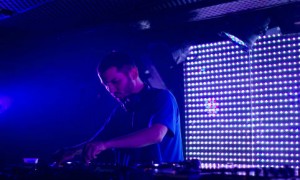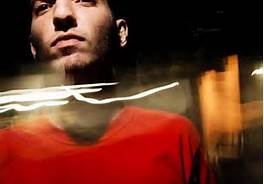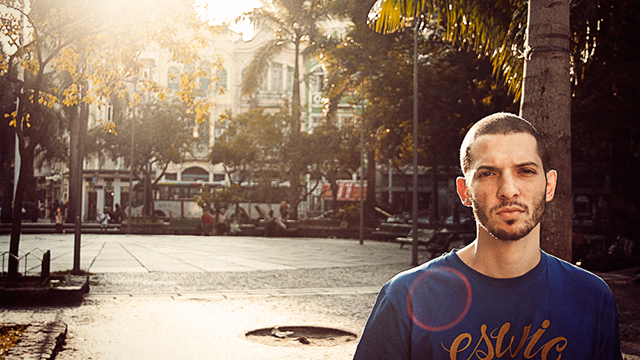Leo Justi is a producer from Rio de Janeiro who's been making waves with his heavy baile style. While Leo has gained increasing notoriety at home for his popular parties, he's also begun to garner international attention through his work with artists like M.I.A. We first featured his music in our 2012 Hip Deep show "Rio 2: Samba Strikes Back." After hearing that he had signed to Waxploitation Records and was preparing his first full-length release, we decided to catch up with him and see what he's been up to lately. Producer Sam Backer met up with Leo when he was recently in New York.
Sam Backer: How’s it going man, it’s nice to meet you. I’m a big fan! Is this your first time in New York?
Leo Justi: No, I was here in 2010, for two months, I played some parties and bars. I got to play a really good party called "Stuff the Turkey Rave" in a warehouse. Then I had almost three years without coming back and this year when I played in Mexico, at Vive Latino Festival I came back really quick to New York.
Do you have an EP coming out soon?
Man, I have mad material in the oven, but with a label it's much slower. They’re looking for the proper time. The label guys think that this album is the best, but I have a lot of tracks that have samples, so they can’t be used on the album. Some of them are just impossible to clear because there’s baile funk mafia guys who just don’t want to be reasonable--they want a 100 percent and they want more. It’s weird to negotiate.
So you use a lot of samples of other baile funk stuff?
Yeah there are some baile funk songs. I just can’t release them in the way Waxploitation does you know, through iTunes, selling music. I can't do what I’ve always done before: Not giving a fuck like most producers do, and just putting it up on the Internet.
Yeah, you can get in trouble. That’s like the "Harlem Shake" guy [Baauer] who got in trouble for having uncleared samples, right?
Yeah, I think he must have lost a lot of money on lawyers for that.
So, that’s really interesting: It’s not U.S. artists, it’s Brazilian artists who have a problem with samples.
Mostly, from what I sample, yeah. It's because I’m living there... One reason I decided to come here and stay a little longer is because I wanted to be
near the vibe of international 
music more. I signed to Waxploitation, right, and their idea is to push me internationally and I want that. I want to play festivals and bring my sound to the rest of the world. Living in Rio, baile funk is really what captivates me the most. Those songs in Portuguese really captivate me, so I ended up sampling that shit, but I think it would be great for me, for this international thing, to sample more stuff from out of Brazil.
Like what kind of stuff are you into?
From here? I love the Bmore [Baltimore club music], and the Jersey club sound. That's really one of the biggest influences on my sound, besides baile funk. And I really like dancehall.
Yeah, one can hear that, that kind of heavy sound.
Yeah that raw and aggressive stuff.
How did you first get exposed to that music?
When I was a little kid, baile funk was blowing up in Rio, in like '96, ’95, and I really liked it. But I also had this neighbor, he was kind of my idol. I really looked up to him, and he liked rock--Smashing Pumpkins, Metallica. And I was singing some baile funk tune one time and he was like “Yo Leo, that’s not good music, that’s shit music.” And I was like, “Yeah that’s shit music, yeah for sure rock is the shit.” So I denied baile funk for a long time. Of course with some songs I wouldn’t say they were shit, but I just stopped paying attention. And then with rap and hip-hop, I started listening to Racionais MCs which was like the hugest group in Brazil. They caught my attention and I started liking rap more. And when I was 17, 18, I started enjoying dancehall a lot and Jamaican music in general. And from there I started to come back to ghetto music like baile funk. My whole life I was playing in rock bands and then I started getting back into club music when I was 17, 18.
Is there a big divide between people listening to rock music and people listening to club music?
Yeah there’s a small group of those alternative people listening to everything, but that’s a very small part of the population. Most would be either rockers or listen to Top 40 mainstream pop music, and then they would just take anything that the radio or TV plays. But there’s a huge amount of rockers that are like, "Oh no, I like rock and everything else is shit, poppy or favela."
Is it divided by where you come from? Do people in the favelas like rock too, or is it mostly people outside the favelas who like rock?
Yeah, it's mostly like that. But there’s weird, small groups within the favelas who are actually rockers, and they hate funk as well and they identify with that whole rocker culture
although they are poor and they are in the middle of the baile funk world. but it’s usually like a white guy in the middle class, who wants nothing to do with the funk world. By liking rock he wants to set himself apart from the mainstream. Nowadays, after the '90s, rock became something that is the mainstream. But until ’96, ‘97 like I remember from my experience in school, I liked rock and dug deeper into it, but most kids didn’t care about it--they would like whatever was playing on the radio.
So with the baile funk, does that cross over on the radio? Is it Top 40?
Now there’s mad baile funk on the radio. A lot, a lot. But it’s a different kind of baile funk, right? Like let’s say the same way you have some Sean Paul, and some really underground violent shit, or in hip-hop, you have some hard shit and then Beyonce and Jay Z, there’s that variety in baile funk too.
That pop success is kind of recent, no?
Yeah, it is kind of recent. Like in 2004-o5 there was this baile funk revival. I mean I can’t really say because I was so young at the time but baile funk came out like ‘94-’95, and then was revived in early 2000s, 2001. But before it was more fun and simple, the songs were more focused on catchy hooks as opposed to strong melodies and lyrics that were developed. I think around that time it became more poppy, mellow stuff. But in the last two years there have been big artists like Anitta. They really blew up huge with this melodic stuff.
So how did you first get turned onto Baltimore and New Jersey club music?
It was from MIA and Diplo’s work. I was more into dancehall and Jamaican music and dub, and my cousin played me M.I.A.’s album years after it was released. I heard it in 2007 and I was like, "Shit that’s really weird and nice and that pleased me." And I started listening to it, and researching and I thought there was some baile funk in it. Around 2008-2009 I started shifting from hip-hop and dancehall, which was my thing, to this baile funk crossover, which was influenced by MIA and Diplo. Diplo was doing a lot of baile funk mashups at that time.
Yeah, that’s how everyone in America heard about it for the first time. So was MIA really popular in Brazil?
Yeah she was, but not like Anitta, you know. But popular enough with the alternative crowd.
It’s super interesting that it went both ways. Like Diplo took baile funk and brought it to other places but he also brought stuff from other places to Brazil.
Totally. On some scale though, I mean baile funk is huge in Brazil, and Diplo is nothing. To a small group of people he’s huge, so he can go and make money there. Like he was just in Brazil with Major Lazer for the World Cup. Budweiser brought Major Lazer. But I think actually he got famous not because of the baile funk stuff he did, but more because of the other stuff he produced.
So how did you get hooked up with Waxploitation?
I released the "Sniper Queen" video in 2012, and at the end of 2012 Jeff Antebi, the guy from Waxploitation, was looking for Brazilian clubby beats, and this guy told him about me and he liked my stuff, and signed me.
So are you not able to put free tracks out the way you did before?
No, I can, it’s just, why did I sign if I’m doing that you know? But I did, I just put out something I did for Kit Kat and I put it out for free because Kit Kat asked me to and I can do that in my contract. Also some edits or remixes I can put out for free.
The "Baile Do Tell" thing was cool!
Yeah, and I have a heavy baile Soundcloud and I upload stuff there too.
So can you explain "heavy baile"?
Yeah, the sound and style is something we started in Rio. It’s dance baile funk and we do this approach to baile funk to make it more internationally digestible, like hip-hop, rave and trap stuff, so we mix baile funk but in an international club music interface. And we have our own master of ceremony, an MC, and two dancers.
It’s interesting because I feel like the heavy baile stuff doesn't use that beat, you know--what do you call that toom-cha-cha sound?
The Tamborzão. Tambore is like the drum. They call any baile funk loop the tambore--there’s practically millions of them. Tamborzão means like little tambore.
Yeah, it’s cool because in the music I’ve heard from you, you kind of cut sounds to make it. So a lot of time it’s not a drum or a beatbox actually playing the beat.
Yeah, but I also don’t stick to the rhythm that most baile funk producers do. They stick to like toom-cha-cha or shoom-sha-chka-shoom-cha but sometimes I go just like toom-toom toom-toom-toom. I switch it up with international rhythms.
From an outside perspective, I think of baile funk as really based on that tamborzão rhythm. So how do you make it without that?
Actually in the '90s it was not that toom-cha-cha rhythm, that wasn’t something that belonged to baile funk. Baile funk was something that was sung, it was all in the voice. Baile funk was a vocal thing because the beats were international, they were American. They used American beats, they didn’t use Brazilian beats.
Like what kind of American beats?
The "Volt Mix" or stuff by Hassan. They're a couple of classics from Miami freestyle. They used that. Only that. And it wasn't until like 1999 that they would they start making their own beats. And they were still mounting their tamborzão on top of the volt mix beat.
Do you know who "Volt Mix" is by?
It’s by Machine Brain. It's just some really underground shit, he probably doesn’t even know
how much money he’s losing. So many people use that shit and he should really be making a lot of money off it.
"Volt Mix"?
"Volt Mix." That’s the one track that so many baile funk tracks use. Also, there’s Hassan, he was also looped many times by the baile funk artists. And only around 2000 they started using the tamborzão. Which sounded more African, you know.
So it probably changed again?
It’s changing all the time. The tamborzão up to 2005-06, and then after that, they started developing the beatbox. That took over. And now they’re developing from that but the pattern got established on that. Now they’re going crazy and doing really good stuff.
There’s also the slower rasterinha?
Yeah that’s something more recent. It came out in 2011 or ‘12, and it’s super slow. But I mean before that people had done that stuff before. There was one track I did, that went from 130BPM to 90BPM, something like that, and then back to 130. It was one of a kind. And now this rasterinha, somebody released the first one, I think it was DJ Lula do Jaka. And he released the first rasterinha track, and brought it all the way down to 90 or 100 BPM. The whole song was like that, and then others came after. So now it’s kind of popular but still not as popular as the 130BPM one. It’s really slow. But there are other kinds of Brazilian music that are slower like axé. I think that’s why I don’t like rasterinha, because it reminds me of axé very much. It should remind me of dancehall, which I love, but it just sounds like axé.
Why should it remind you of dancehall?
The beat. A lot of people relate it to that. But I relate it to axé you know, because it’s 
Portuguese. Actually, you know I love baile funk, but I only like 20 percent of it and I think 80 percent of it is total shit. I think most music is like that. But especially dancehall and baile funk there’s so much shit, I think hip-hop has a little less shit. Hip-hop has a lot of good production, so usually it’s easier for me or any other Brazilian to accept that it's good music even though the lyrics might also be shit.
So do you mean the quality of the production or the quality of the music?
The quality of the music. I mean let’s say the guy is singing one melody and then throwing down a bass line on the guitar in another key, that kind of shit happens in dancehall a lot, in baile funk, but it doesn’t happen much in hip-hop.
So you mean just like sound quality?
In America, yeah, and in the U.K. In America usually the music aspects of it are more in tune. And in Brazil and in Jamaica, they never really got the harmonic elements, they just got the drums.
How did you first start producing?
I was 8, 10. I started playing violin when I was like 7. Then at 10 I started playing guitar, so I was always composing. After I came back from an exchange in Germany, I had bands, and I started to want to make beats. I started deejaying, then after I started listening to Diplo I got into more clubby, electronic music, but I never liked house or trans or electro before that. Diplo opened those doors for me. And after Diplo, a little bit of Crookers from Italy, Switch, this U.K. guy and then I started exploring but it was Diplo who opened the door.
So what’s on the mixtape?
A lot of originals, and a lot of remixes. Like 90 percent exclusive stuff. And a couple of important hits from baile funk.
Can't wait to hear it.










